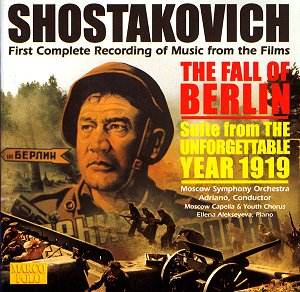From time to time, Shostakovich made his life tolerable
by concentrating on less serious activities and for him this meant writing
music which would be more acceptable to the authorities. This manifested
itself in the production of some 35 film scores as well as other secular
works. Given that he wrote 147 numbered works, his work in the film
was, at least numerically, a significant part of his output. We may
wish to consider this work more seriously than we often do. Shostakovich
was writing film scores between 1929 and 1970, i.e. throughout his entire
musical development. Unlike some of the more famous Hollywoodiana, Shostakovich’s
film scores often display symphonic structure, which makes them more
satisfying to listen to than scores by lesser composers.
Marco Polo is in the process of recording much film
music, including this first recording of Shostakovich. These are world
premieres for The Fall of Berlin, and the premiere complete recording
of The Unforgettable Year 1919.
The Marco Polo production is first class – with extensive
notes (English only, I am afraid) with a synopsis of each plot and stills
from both of the respective films.
The Fall of Berlin was a Mosfilm production
of 1949 and 1950, in both colour and black and white, in two parts,
directed by Michail Chiaureli and based upon a script by Chiaureli and
Pavlenko. The latter had already been involved in Eisenstein’s Alexander
Nevsky. The film belongs to a type in the Stalin period known as
"artistic documentaries". These were intended to impress and
instruct the masses, and, as was usual, to present an historical truth
in an often forged or reinvented form, to serve propaganda purposes.
An example of this is in the finale. Here Stalin is seen arriving at
Berlin airport to congratulate both his troops and the Allies. He delivers
a speech to thousands of people, not from a tribune, but from the ground,
and this without even a microphone. Stalin had always refused to travel
to Germany and did not do so after the end of the War.
The documentary is about Hitler’s last days, but the
film also was in the form of a love story, involving the two principal
characters Alyosha and Natasha. One of Alyosha’s friends ended up in
the film being part of the raising of the Red Flag above the Reichstag.
This was also faked and distributed as propaganda. It was not until
recently that it was revealed that the ‘original’ picture had been a
filming of a re-enactment to ensure that the lighting was just right.
This is the first time the whole of the score has been released. It
consists of the Main Title to both Parts 1 and 2, plus 14 other items.
The second film is "The Unforgettable Year 1919":
Suite Op 89a, 1951. This film, also directed by Chiaureli, is again
a love story wrapped around Stalin’s early activities at the end of
the First World War. It won an award at the 1952 Karlsbad Film Festival.
The film shows Stalin being very active on the battlefield (far more
so than was the truth).Stalin’s purging of the army and the fleet of
traitors forms the political basis of the film. This film contains a
mini-piano concerto in the style of Addinsell’s Warsaw Concerto.
Shostakovich’s piece sounds somewhat out of place in the complete score,
which is probably why it has been omitted from previous recordings of
the film score. It has been recorded separately by Dmitri Alexeev on
Classics for Pleasure.
The Moscow Symphony Orchestra sounds as though they
are enjoying the music. Adriano conducts it to the manner born. The
recording quality is a little bit raucous which I suppose is in general
keeping with the content of the music.
A most enjoyable release. I hope it does well, and
influences Marco Polo to release further titles in the film music of
Shostakovich.
John Phillips
see also review by E
D Kennaway and Rob
Barnett
